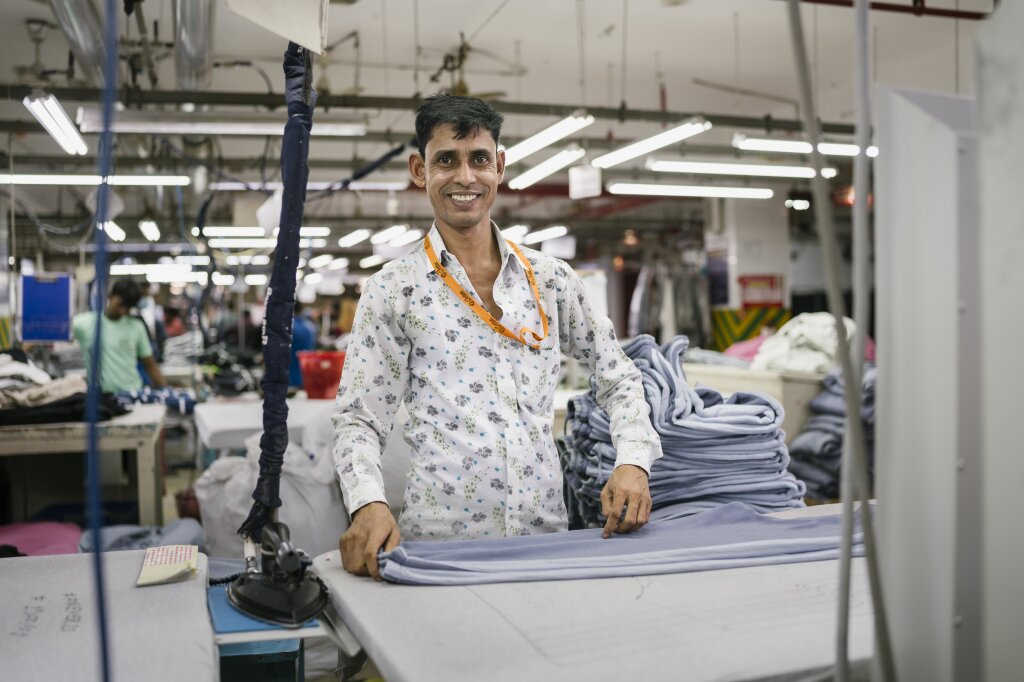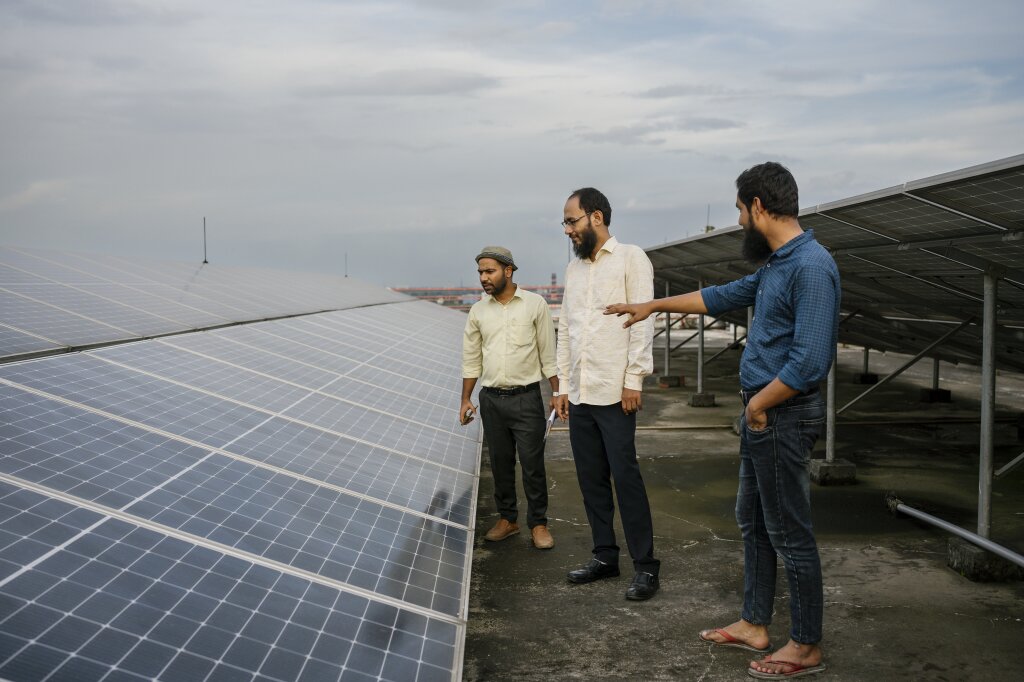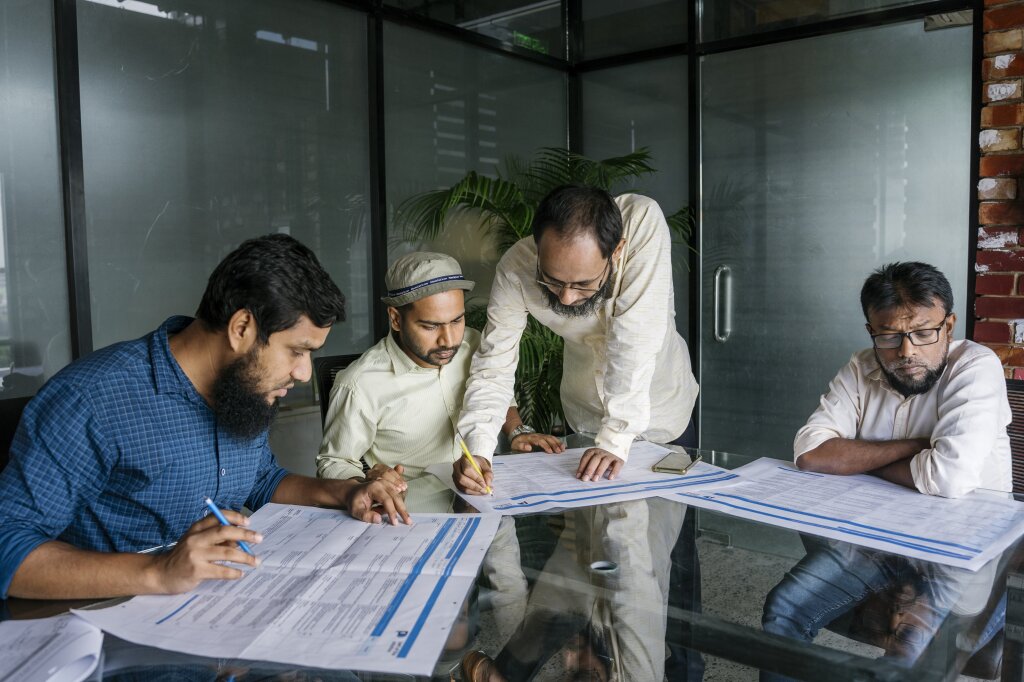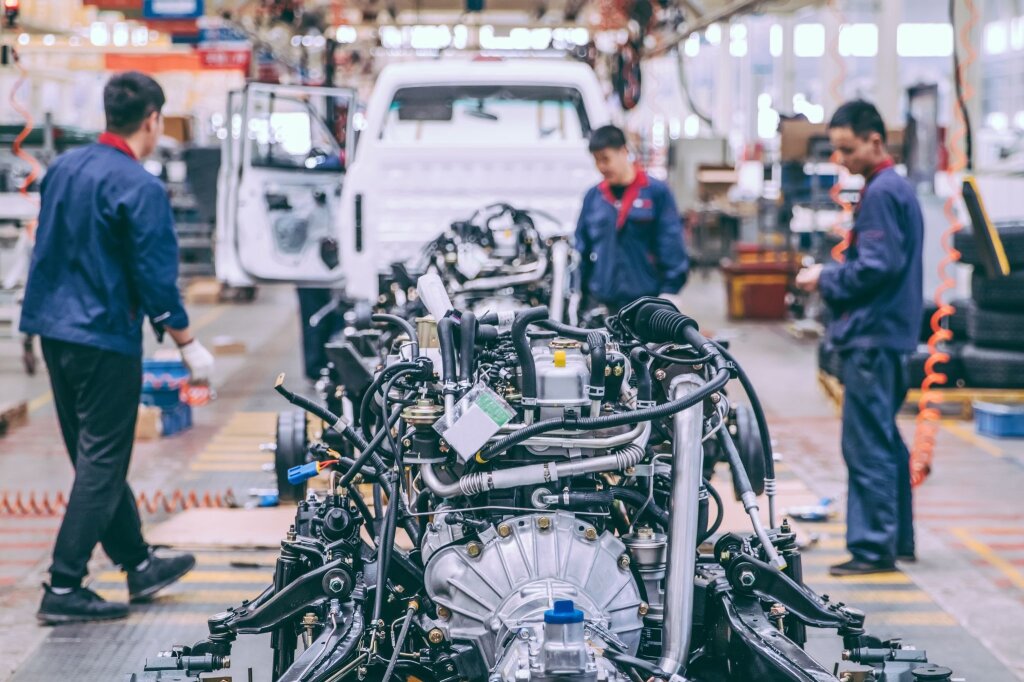Implementing a supplier development programme to reduce CO2 emissions in the textile supply chain.
Summary
ScaleZero, a supplier development programme, launched in collaboration with the Otto Group, aimed to decarbonise the textile supply chain by empowering suppliers to set and manage their own carbon reduction targets. Through awareness building, capacity development, and practical tools, suppliers were equipped to autonomously manage their emissions. Eight suppliers in Bangladesh participated, substantially improving their emission management practices while significantly reducing emissions through initiatives like solar power installations and energy-efficient upgrades.
Situation
Brands and retailers in the garment industry face increasing pressure to reduce greenhouse gas emissions across supply chains. The Otto Group, a globally active retail and services group, is committed to achieving net zero greenhouse gas emissions throughout its entire supply chain by 2045, and set an ambitious near-term Science-Based Target (SBTi). However, a majority of emissions are classified as Scope 3, meaning they lie deep within the supply chain.
A significant challenge arises from both the lack of transparency in textile supply chains and retailers' limited influence on supplier practices. As a result, companies like the Otto Group must identify the most effective leverage points to drive meaningful change across their supply chains. At the same time, they face the difficulty of efficiently allocating resources, as on-the-ground projects with suppliers are often resource-intensive and costly to implement. Success hinges on building partnerships where suppliers not only comply with demands but actively embrace emissions reduction.
The key is empowering suppliers with both understanding and agency. When suppliers grasp not only what they need to do but why it matters, they transform from passive participants into active innovators. With a clear understanding of emissions reduction - its role in compliance and its broader environmental impact - suppliers become active participants rather than passive observers. Given the right tools and knowledge, they can take ownership of their emissions management, creating innovative solutions that strengthen their operations while building a more sustainable supply chain.
For POTS, the central question in developing the ScaleZero concept was:
How can we create a framework that empowers textile producers to independently drive and manage their greenhouse gas emissions reduction?
Objective
Empower suppliers to pursue their own emission targets independently
We recognized that lasting impact would only come through scalability and sustained supplier engagement. To achieve this, it was critical to foster awareness and a sense of ownership in suppliers for their emissions reduction, rather than simply imposing pre-determined measures.
Process
This vision guided us through months of careful programme development, resulting in the ScaleZero initiative. The pilot’s implementation began in April 2023, and included eight factories in Bangladesh, which were selected based on their strategic relevance for the Otto Group.
Methodology
ScaleZero’s Maturity Matrix, served as the basis for assessing the suppliers’ carbon management systems and defining key areas of action. The matrix includes crucial elements such as GHG emissions inventories for Scope 1-3, reduction targets, reduction measures for Scope 1-3, and reporting practices. It served as a management framework enabling the provision of individual recommendations and subsequent matching of suppliers with local service providers.
The key project activities were:
Onboarding & Awareness Raising: POTS organised an online webinar with the Otto Group and eight of their Bangladeshi suppliers, introducing the importance of emissions reduction and target-setting. Jointly with each supplier we then identified their specific challenges and focus areas for carbon management. Through these sessions and follow-up data collection, we built an initial understanding of each supplier that informed our pre-assessment.
Carbon Assessment & Monitoring: During on-site visits at the factories, we introduced the Maturity Matrix. In interactive workshops, suppliers got to know this tool in-depth and used it to evaluate their own performance through self-assessment, which we then validated together. This hands-on approach, combined with document review and data verification, proved to be particularly effective for learning and understanding emissions management practices.
Action Plan Development: After assessing each supplier’s carbon management using the Maturity Matrix, we collaboratively identified key areas for improvement and developed tailored action plans. Each supplier defined specific emissions reduction measures and set mid-term GHG reduction targets. Prioritised activities were integrated into these plans to target high-impact areas such as energy efficiency and renewable energy projects, including solar installations and machine upgrades.
Implementation Support & Monitoring: POTS provided continuous support and mentoring to suppliers during the implementation of their action plans to ensure they are on track and receive necessary guidance for any challenges they encounter. We further matched suppliers with relevant service providers and self-service tools to aid in emissions reduction measures.
Results
Over the course of 15 months, ScaleZero enabled suppliers to take ownership of their emission reduction efforts, moving beyond awareness to actionable steps.
Specific results include:
✔️ All 8 suppliers signed a letter of intent to set and implement GHG reduction targets
✔️ All factories set themselves medium to long-term emission reduction targets, while some even plan to adhere to SBTi
✔️ All factories allocated clear responsibilities for carbon management
✔️ All suppliers implement emission reduction measures, mainly in the areas of Energy Efficiency (e.g. replacing outdated machinery with more efficient ones) and Renewable Energy (e.g. construction of solar power plants)
✔️ 5 suppliers reported that they started engaging with their own supply chain in order to address Scope 3 emissions
✔️ Conservative estimates indicate that the measures implemented across all suppliers have the potential to reduce over 10,000 tons of CO2e annually
Learnings
Our pilot revealed three key insights for successful supply chain emissions reduction.
Reducing emissions needs push from brands: Supplier engagement requires clear direction from brands. We found a notable lack of awareness around the importance of emissions reduction, highlighting the need for buyers to better communicate their expectations and compliance requirements.
Practical guidance: The program revealed that decarbonisation is slowly becoming a priority for suppliers, though their climate maturity levels vary widely. Climate action plans need concrete, measurable outcomes - suppliers often struggle to translate broad targets into specific operational changes, indicating a need for support in developing clear subtasks and KPIs at the management level.
Direct engagement on the ground: On-site verification proved essential, as remote monitoring alone couldn't effectively track actual progress. ScaleZero's field visits uncovered critical gaps between reported and actual implementation, revealing misunderstandings among suppliers and highlighting the need to engage on the ground in Bangladesh.
These findings underscore the importance of combining clear brand leadership, practical guidance, and direct engagement to drive meaningful emissions reduction across the supply chain.
ScaleZero works. Reducing emissions is a marathon, not a sprint.










